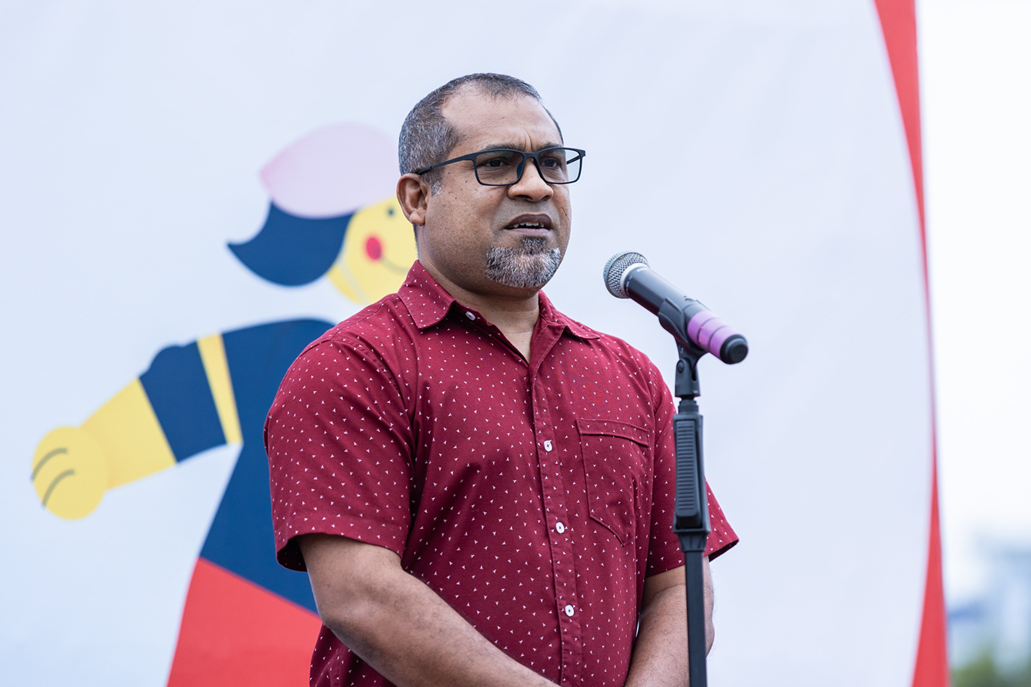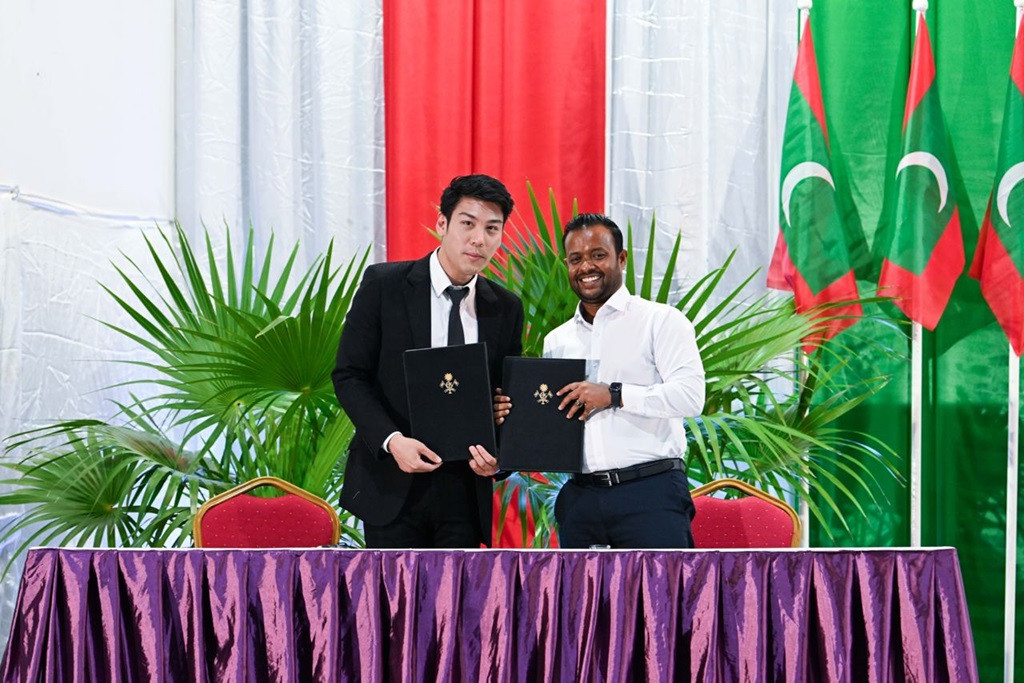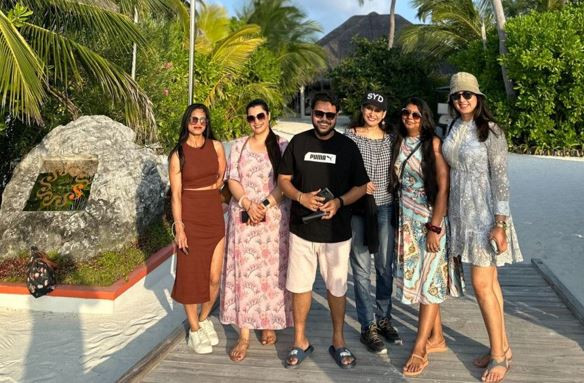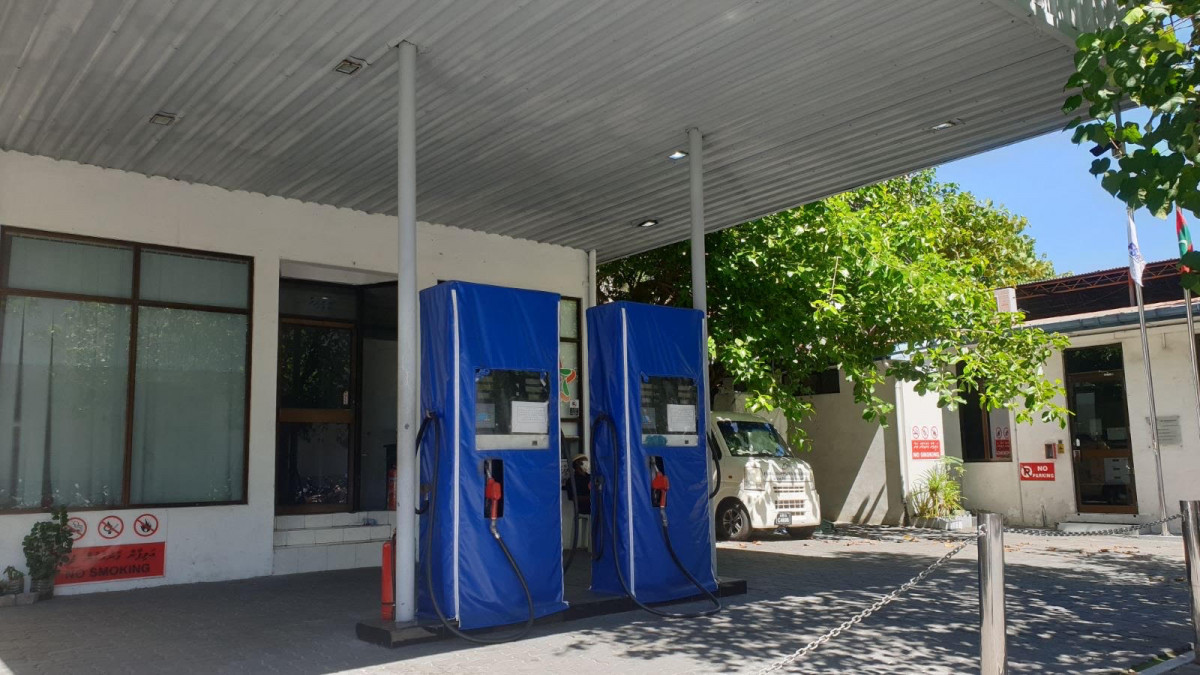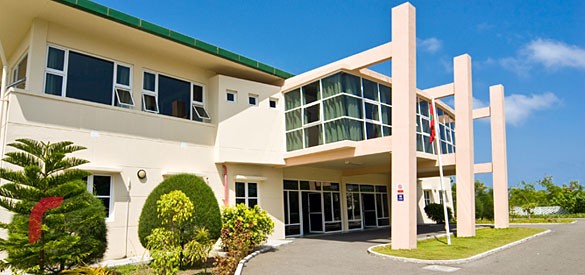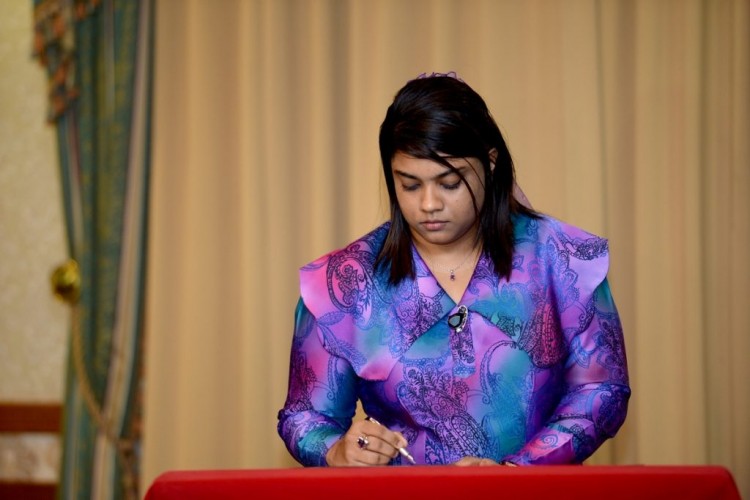'State of Violence'
"Force does not create right and the ability to coerce is not a legitimate power of the state"

A woman pepper sprayed in the face by a uniformed officer
The English philosopher, Thomas Hobbes, believed that the natural condition of mankind was one of conflict and war in which human life was ‘solitary, poor, nasty, brutish and short.’ As a political philosopher he argued that people formed states to avoid this.
But, looking at the predicament of Maldivians today, I have to wonder if the Hobbesian argument has not been turned on its head; that the state has become the perpetrator of the violence and the natural condition of people could perhaps be a safer alternative.
Humans, like all primates, are gregarious animals. While violence and conflict may well be a part of our genetic blueprint, our early ancestors learnt that the ability to work together as a group increased their chances of survival. In a hostile world, they depended on cooperation for food, security and the socialization of the young. Not surprisingly, cooperation has profound evolutionary roots.
In the 1700s, the French philosopher, Jean-Jacques Rousseau, among others, looked at how a group may function in a state for protection. His theory of the Social Contract argued that the citizens who received the protection of the state empowered it in return to make laws to regulate their behaviour - behaviour that would enhance the whole group’s ability to survive and live productive lives.
Rousseau stressed that the laws of the state are binding only if it is supported by the general will of the people. Force does not create right and the ability to coerce is not a legitimate power of the state.
Under a dictatorship, as we have in the Maldives today, this Social Contract is shattered. Much has been made of ‘benevolent dictators’ in various parts of the world, but the variety we, the Maldivians, have had the misfortune to live under, have always been motivated by narrow self-interest, megalomania and an insatiable hunger for immense wealth.
Dictatorships result not only in the collapse of good government, but also in a breakdown of society itself. The violence that is displayed on our streets night after night is the inevitable outcome of the chaos that is the state of the Maldives today.
What of our history?
A personal view point on the growth of violence in the Maldivian society is legitimate to a point; there are insights to be gained by looking at our own experiences and how we interpret those experiences as a larger narrative of the country’s history. It may not be the official view nor is it without personal bias as true histories should be.
I was born in 1950 and grew up in a house located in a narrow lane in Galolhu. Han’dhuvarudhey Goalhi was typical of the small lanes of about ten households. I knew all the people who lived along the lane as I visited all of them and ran around their gardens with a group of friends. All of us regarded the whole block of land as our own back yard.
In the 16 years I lived there I heard of only one incident of violence on the street. I am mindful of the fact that such things might have been kept from young children, but this does not deter me from thinking that life on the street was mostly harmonious if the scandal of one single parent smacking her children’s knuckles with a stick was talked about as a most heinous act of violence.
In the early 1960s three foreign teachers were dismissed because of their violence against students! This turned out to be nothing more than one of them smacking students’ arms with a ruler. Parents complained to the Ministry of Education as they could not conceive a teacher, someone who was revered in our society, could use something as barbaric as physical violence.
Perhaps the incident that best portrays the overwhelming abhorrence of violence by Maldivians is the unlikely story of Johim Blum, a German tourist, who murdered his partner while visiting the Maldives. The event shocked the locals so completely that, according to one report I received - I was then studying overseas - most of the population of Male’ took time off their work to visit and mourn the body of his unfortunate victim.
What followed was even more bizarre. Such an act of violence was so rare in the country that the only punishment they could think of was to banish Blum to the island of Fulhadhoo in Baa Atoll where he eventually married a local girl and started a family.
Having visited and lived on Fulhadhoo for some months myself, I have to agree with the conclusions of award winning journalist Morley Safer’s assessment of the island life as the closest thing to paradise. The point here is that violent behaviour was so foreign to the Maldivian psyche of the time that we had no understanding of the nature of violence and even less of how to punish such transgressions.
Yet, on the 2nd of March this year, I watched, with unbelievable pain and mounting anger, the footage of a young woman, possibly younger than my own children, repeatedly pepper-spray my sister who is a woman of gentle demeanour and kind disposition. Her only misdemeanour was standing at a street corner, watching a group of people gather to denounce the violence perpetrated by the present government.
What has happened in our culture to empower a young, female member of the Special Operations riot police to act with such impunity towards a woman, possibly fifty years her senior? What has happened to our culture to legitimise physical violence to a degree that vicious beatings, disappearances, sexual violation, torture and murder have become an everyday aspect of our social landscape? What has happened to our culture?
Thirty years of dictatorship has happened.
The true trickle-down effect
The term ‘trickle down’ is used by economists and politicians to explain a process - possibly real, possibly imagined - by which wealth spreads downwards in a society. In other words, if the top echelon of a society is enabled to produce wealth, eventually those in the middle and lower ranks will gain too in the form of employment and other opportunities.
Personally, I have never agreed with this rather romantic view of economic growth. And now, I do not feel the theory can work at all in the modern Neo-Liberal states. When globally as few as eight people are worth as much as half the world’s wealth, the subsequent inequality does not allow the trickling of wealth to any meaningful extent.
However, I have seen the trickle-down effect work in another situation. As an educator who came in constant touch with families and children, I have seen how violence trickles down, passing downwards from parents to children and from generation to generation. A culture of violence at the top - be it in a family, institution or a state - trickles down the ranks and change long held views of behaviour.
I am old enough to understand that over-population, poverty, the gap between the have and have nots as well as the use of drugs are factors that reduce trust, alienate people and increase their inclination to use violence as a tool to deal with their problems.
However, I would argue that in the case of the Maldives, the sudden explosion of violence is a result of what was allowed to happen in our prisons between 1978 and 2008. The United Nation’s report of July 2012 pointed out that “... many testimonies suggest the only limit to the torture and ill-treatment imposed was the imagination of whose control they were under.’ Violence became normalised in our society.
Desensitisation is a central issue here. Several scientific studies have pointed out the fact that watching violent movies reduces children’s empathy towards victims of violence and increases their tolerance of violent acts. Repeated viewing of violent programmes by children increases their tendency to use violence as a means of solving problems. Similar patterns of desensitisation are found with adults.
If the make-believe world of television could have such a profound effect on our attitude to violence, think of what impact the real-life and state-sponsored daily violence has on young people who grow up witnessing it on their streets. Just as importantly, what does it do to those who are given the right to practise it with impunity?
The vicious circle
Violence cannot and should not be used to achieve unconditional deference to patriarchy or the authority of the leader. This is not simply a fashionable statement to do with human rights abuse. The consequences of such violence are massive at a societal level because it is stupid to think that we can limit the violence to public gatherings, prison grounds or for that matter, to households.
The members of our riot police maybe trained not to think; or perhaps their selection criteria is based on an inability to think, or a lack of moral ethics. Whatever the case, they need to be reminded that Maldives is a small place. People at the receiving end of pepper-spray or batons do not forget the face that caused the damage. The members of the special force may be the weapons of someone else’s war, but it is their violent actions which are recorded and preserved. When the present government runs its course, the people who gave the orders will be safe elsewhere, far from the angry mobs.
Nor is it simply a question of retribution. People who engage repeatedly in violent activities change their own attitude to it. Years of beating others into submission will impact on their own lives. Their own wives, husbands or children could become the victims of the belief that violence is the way to solve problems.
The plight involving the failure of many returned soldiers to adapt to civilian life is a case in point. Many find that their action in combat has created within them an acceptance of violence as an everyday event. Instances of their inability to establish normal human relationships with others are well documented.
And what of the person who actively perpetrates this violence? Yameen, as the leader of the pack, is a man of little imagination and even less sense of moral right and wrong. An atrocious lust for power and wealth seem to be the reason for his existence.
Behind him is a band of men and women who are so tainted by their obedience to a bully, they cannot afford to let go and think for themselves. They must prop up the dictator Yameen or they fall. What is at stake is not just their status; they will also lose the ability to use the wealth of the nation as their own private coffers.
But, here is the thing. In order to sustain his grip on power, Yameen must keep increasing the level of violence because what he has started is a vicious cycle of violence. As he fills his prisons with more objectors to his style of leadership; as he increases the number of his special forces to push, shove and beat the demonstrators; as he plots and executes the sudden disappearances of more and more liberal thinkers in the society, there will be more people and more families angered by his brutality.
It is naive to think that those who are at the receiving end of this treatment will remain controlled, responsible and forgiving. The terms of engagement will change and this is what I fear most about the course Yameen has taken.
Violence begets violence.
